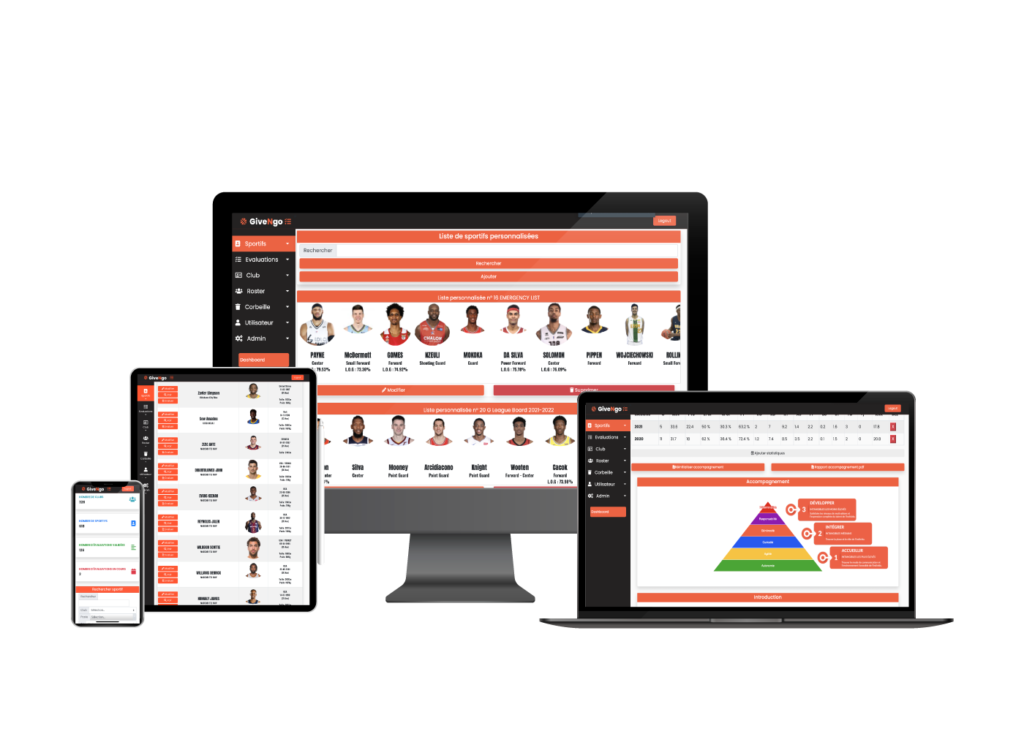"MAKE THE INTANGIBLES OF PERFORMANCE TANGIBLE"
AUTONOMY
DÉTERMINATION
AGILITY
GENEROSITY
CURIOSITY
RESPONSIBILITY
The relevance of intangibles is verified thanks to neurosciences which establish a correlation between the release of neurotransmitters and the behavior of individuals.
THE GIVENGO SOFTWARE
The project is based on the idea that each individual has a talent, a potential to develop. The idea is also that an individual is all the more efficient, as the field in which he evolves, makes him happy and allows him to flourish. Applied to basketball, the main question is not so much whether a player is made to play basketball, but rather whether basketball is made for him. The challenge of the project is to promote the development of players, allowing them to exploit their potential.
The collective aspect is also inseparable from individual success. A favorable environment, a team, a framework, an institution are also essential for individual performance and vice versa. The player must be adapted to the team to allow the collective to exploit his potential. The approach to the project is therefore both individual and collective. The objective is therefore to seek out the players who make the collective progress the most and to find the ideal environment for them to flourish.

The means to achieve these objectives go through the study of technical, tactical, physical and psychological data, from a collective and individual point of view. This data is in the form of statistical match data, and expert assessments. Statistical data comes from data centers.
The evaluation criteria include technical, tactical, physical and psychological fields. They constitute the heart of Givengo’s added value. These evaluations are grouped into four determinants and six performance intangibles and detailed into 24 criteria and 96 elements.
The relevance of intangibles is verified thanks to neurosciences which establish a correlation between the release of neurotransmitters and the behavior of individuals. For example, a very determined athlete releases a lot of dopamine; or a responsible athlete, resulting in a strong commitment to the mission, releases more serotonin. These studies based on neuroscience do not imply having to perform real-time measurements of the players, but make it possible to verify that an observable behavior of the player has a real impact and therefore influences the performance of the athlete.
A NEW CONCEPT OF TALENT INSPIRED BY NEUROSCIENCE
And if everything depended on our love for what we do and the pleasure we have in doing it. Today, based on the latest research in neuroscience, we can help you find out if the orientation you have chosen, if your aspiration, your element of expression allows you to reveal your talent.
The question is not whether you are made for what you do, but whether what you do, and who you do it with, allows you to be who you are.
By asking you about the link you have with your activity or your project, or by observing your behavior when you express your potential, we can, by evaluating the determinants of your discipline, and the link you have with it, establish your Love Of The Game (L.O.G.).
The L.O.G. is based on 6 key neurotransmitters, which define the pleasure we have in being in our element of expression.
6 neurotransmitters that refer us to 6 performance intangibles that we all have, but which will reach different levels, depending on the activity chosen to express your talent. 6 intangibles to know if what you do makes you happy and therefore efficient.
OXYTOCIN
Approaches Generosity: Which strengthens us by pushing us to share with others.
ENDORPHIN
Approaches Autonomy: Which masks the pain and allows us to last in the effort.
DOPAMINE
Approaches Determination: Which drives us to succeed.
NOREPINEPHRINE
Approaches Agility: Which allows us to deal with contingencies and dangers.
SEROTONIN
Approaches Responsibility: Which makes us proud of ourselves
ACETYLCHOLINE
Approaches Curiosity: Which allows us to memorize and learn.
